
Quartet Review
From their early days in the 80s to now, console RPGs are full of storied moments and doldrums. The genre found immediate success in Japan on the Nintendo Entertainment System with Yuji Horii's Dragon Quest and Hironobu Sakaguchi's Final Fantasy, but struggled to find the same global audience until the meteoric breakout of 1997's Final Fantasy VII. Even before the 1997 glow up, though, titles like Phantasy Star IV, Chrono Trigger, and Final Fantasy VI were delighting a loyal (but consistently smallish) group of fans with their heroic stories, crunchy stats, and unforgettable characters.
Now, those kids are all grown up and making games of their own. Over the last few years, we've seen an explosion of retro revival-style RPGs released on modern consoles. Inspired by the 16- and 32-bit genre golden age, titles like Sea of Stars, Chained Echoes, and Eiyuden Chronicle: Hundred Heroes combine pixel art sprites, turn-based combat, and expansive, colourful worlds into experiences that evoke those mid-90s gaming memories while also attempting to modernize the experience with decades of new technologies and game design methods.
Among the latest of these is Something Classic's Quartet, a pixel art RPG with some lofty inspirations and an even higher bar to clear thanks to its top-notch contemporaries. Loading up a new save in Quartet presents players with a choice: four protagonists, each a hero in their own right, and the start of their story. As each chapter comes to a close, the stories converge, and a startling truth about the world sets off an adventure with predictably high stakes.
But, how does it compare against its heady inspirations and fellow throwback RPGs? Is it something classic? It's complicated.
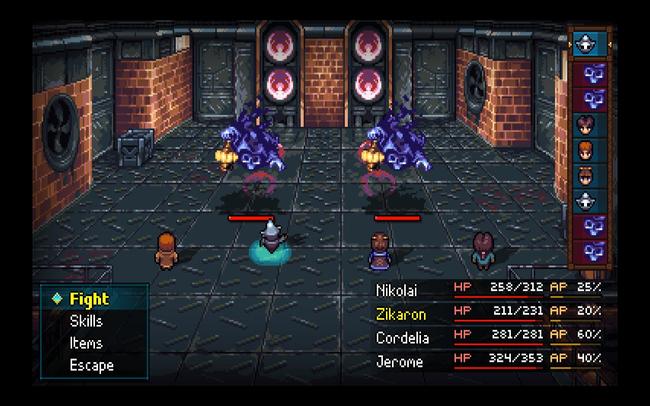
"Final Fantasy VI for people with a job"
When I spoke with Quartet designer and writer Patrick Holleman for my 2022 book, "Fight, Magic, Items," he described their vision for the game as "Final Fantasy VI for people with a job." As a kid who first fell in love with RPGs thanks to Final Fantasy VI, my friends and I could spend hours, days, and weeks plumbing its depths. So, a game evoking that classic title, from someone who understands the genre as well as Holleman, was irresistible. As an aging millennial dad belaboured with a day job, responsibilities, and carefully rationed gaming time, his approach appealed to me from an availability perspective.
It's an ambitious idea: chasing one of the genre's all-time greats, while also trying to wrest it into an experience that appeals to fans of the original, but in a way that reflects who they are now, not who they were in 1994. Understanding how to make "Final Fantasy VI for people who have jobs" first requires an understanding of what made Final Fantasy VI so special in the first place. Developed in less than 12 months by an all-star team of Square designers, programmers, and artists, Final Fantasy VI was defined by ensemble success within and without. Like its jam-packed creative team, Final Fantasy VI eschewed the concept of a singular hero, instead assembling an unlikely ragtag group of rebels united not by a person but by purpose. You can argue amongst yourselves that Terra Branford or Celes Chere are the true protagonists, but the fluid narrative and the agency it provides the player — not only in the way they build out their party of rebels, but also in how you interpret and weigh the narrative and personal conflicts — embodied an experience that felt unique to every player. There was no wrong way to play Final Fantasy VI. No wrong party configurations, no wrong character builds, no wrong way to tackle the game's latter half: an open world quest-heavy section known as The World of Ruin.
There was only your way.
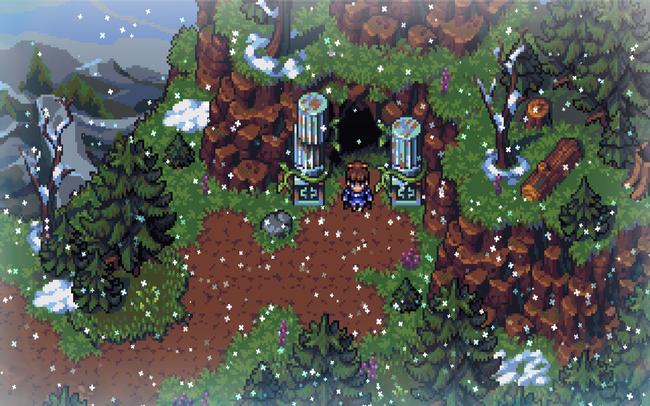
Quartet opens with a choice. Four characters, described only briefly, lounge on a bespoke diorama. You must choose one to start, though you'll eventually play them all, and the order doesn't matter. In this way, it evokes PlayStation classics like Wild Arms & Suikoden III, and it promises a narrative that weaves together, rather than unravels. Quartet's opening chapters are each focused on an individual "hero," though, like Final Fantasy VI, none quite fit the mold or assert themselves as "protagonist," and each chapter is a tight, character-focused mini-narrative.
The lazy, self-deprecating chef Ben embarks on an amusing journey of self-discovery, fascist military man Nikolai questions his role in a quickly expanding war, Cordelia's search for answers leads her far outside her scholarly city, and young Alexandra's tech-y background means nothing as she seeks the cause of her mother's mysterious illness. Each of these primary characters is given clear motivations and conflicts, all of which dovetail nicely towards Quartet's satisfying (but perhaps held to the chest a bit too long) twist and ending.
On the flip side, however, they're each joined by a complementary companion, eventually creating a party of eight. Unfortunately, these characters — the hippo Juna, the warrior Agata, the mysterious automaton Zikaron, and the most generic man alive Jerome — offer little of the depth and conflict as their main player counterparts. Though their stories are eventually fleshed out during endgame quests, it's too little, too late, and left me wishing I'd known more about them from the beginning. The same could be said for lower-tier members or Final Fantasy VI's cast — not everyone could be Terra, Locke, Celes, Sabin, or Edgar — but immediately I understood Relm's conflict when she joined and how that tied tightly into her grandfather Strago's. I knew Gau's troubles, Setzer's self-destructive heartbreak, and the pursuit of Shadow's tragic past. With almost half the number of playable characters, Quartet felt, at times, constricted by its novel structure, rather than letting that smaller cast flourish and develop above and beyond what Final Fantasy VI could accomplish due to its huge scope and short development time.
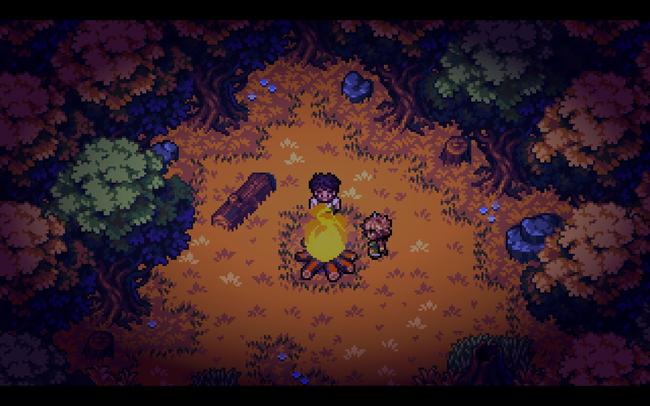
Taken as a whole, Quartet's narrative satisfies with many callbacks to other classics, like Lufia: Rise of the Sinistrals and Chrono Cross (for reasons that I won't get into for fear of spoilers), and the strength of its ensemble cast as a whole, if not as individuals. But, at times, I wished it would contextualize the seemingly disparate conflicts in a way that felt more organically entwined, instead of leaning heavily on a third act twist that dramatically alters world traversal, structure, and pacing.
Which, then, of course, brings us to the "for people with jobs" part of Holleman's sales pitch. When I was eleven years old playing Final Fantasy VI, very little could stop me… besides school, bedtime, and swimming lessons. Time was abundant, and my parents were cool with me playing Super NES in my room. As an adult with kids, a mortgage, a full-time job, a second job as a writer, and, like, a social life and stuff, time is the biggest predator when it comes to enjoying video games. I don't know what I'd do without modern suspend features, but Something Classic, a team comprised of similarly Millennial folk, understands that while the games we played might've been made with kids in mind, modern games have to compete with not just each other but bill payments, early morning drop offs at hockey practice, and dinner that's not going to magically appear on your plate.
Every effort in Quartet steers it toward bite-sized commitment. Just as we eat our meals one-bite-between-dressing-our-kids, we can find ourselves playing games the same way. The most obvious way Quartet does this is its opening structure of standalone mini-stories that eventually join, but I'll get to that in a moment. Its other evident time-sensitive component is quests that are designed to be completed in 30-45 minute sessions, offering satisfying conflict and conflict resolution in the same Pop Tart. It works fairly well on a micro level, allowing each plot beat to move by quickly, and no dungeons overstaying their welcome, but on the macro scale, it becomes more noticeably stodgy.
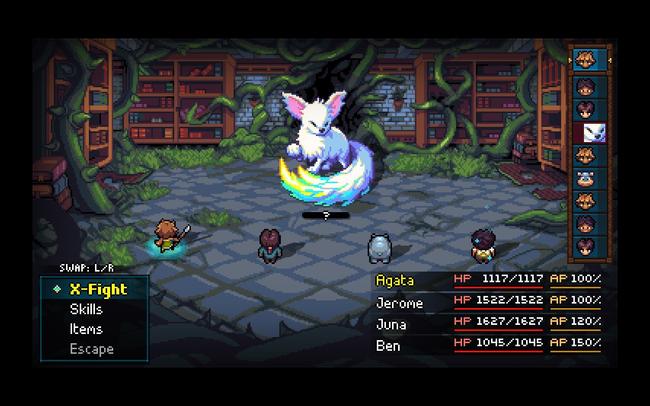
When you load up the first of the four scenarios, you're treated to a fast, lively introduction to the main character and their conflict. You go on a little adventure, you solve some sort of mystery, but, more importantly, kick off a few more. In a vacuum, they're perfect little introductions — helping me care about the characters, their world, and their motivations. When you finish that first chapter, though, just as the story's starting to hit its stride, you're kicked back to the character selection scene and asked to pick the next scenario.
This staccato pacing leads to major momentum stalls whenever you reach the end of a chapter. You've spent 2-3 hours investing in a conflict and characters, and, just as it's about to get real, you're kicked back to the beginning of a story and its introductory pacing. 2018's Octopath Traveler suffered from a similar issue, but at least in that game, you could continue to forge forward with any of the storylines you found most interesting and had agency in how the overall narrative progressed. In Quartet, you get going and hit a brick wall. When you've finally finished the four introductory chapters and a few follow-ups, it's 12 hours before your entire team's united and the game's core conflict and antagonists can be queued up. Maybe not a lot for a 100-hour Persona game, but when Quartet clocks in at around 20 hours, it feels like far too long, especially because most of the endgame, where the most interesting character building occurs — especially for the four side characters — is all optional.
One of Final Fantasy VI's great strengths is that it moves through narrative conflict with a relentless tempo, always dangling the next big story moment right in front of you. And it eschews templates for new experiences, varying its set pieces with moments of solitude, like Cyan's journey through the Ghost Train, slapstick adventure, like Sabin's infiltration of the Ghestalian military camp, and subterfuge, like Locke's return to Narshe. It does this, however, by starting each of these stories, selected in whatever order the player chooses, at a moment of heightened conflict. Finishing one story and starting the next carries momentum and cements the feeling that even these separate conflicts are part of the larger whole. Contrast this with a game like Live A Live, which leans into compartmentalized stories for each character, before surprising the player late in the game by connecting them all into an overarching conflict. Quartet, to its detriment, straddles both sides of the line, front-loading the choice, but requiring the too-late dovetailing narrative for satisfaction, never committing to either idea.
"We understand that JRPGs are the child of compromise," Holleman concluded in our conversation, and finding that balance between accessibility and scope is a razor-thin walk made even more difficult by comparisons to classics. So, what I'll say is this: Quartet tackles its ambitions not via sprawling scope and size, but by cramming as much as possible into the smallest space available, and, in that way, it mostly succeeds — even if it didn't turn out to be the modern Final Fantasy VI of my dreams.
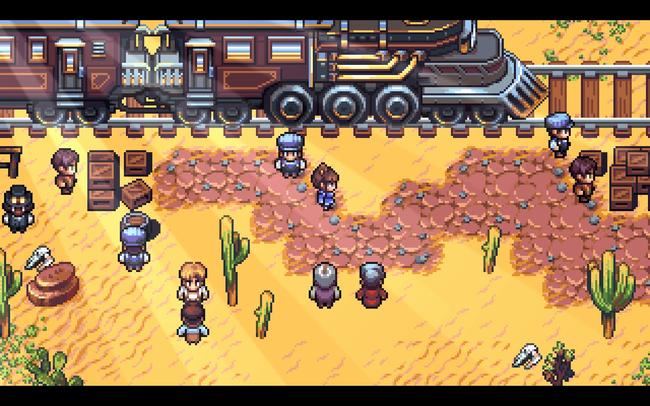
Building a new world, one pixel at a time
One of the key elements for a secondary world fantasy like Quartet is to grant immediate stakes by plunking the player in a world they immediately care about and want to protect. Final Fantasy VII does this with its strong sense of place and the passion of the AVALANCHE crew's environmental activism. 1000xResist does this by trusting the player to follow a thread of familiarity as they discover the secrets of an upended world. On the flip side, I've argued that Final Fantasy X misses the mark with a bombastic opening that dazzles the player with shallow imagery, a world they never get to explore, and mysteries that would be better served over the game's longer narrative arc, and forces the player through a couple hours of decontextualized tutorialization before its true opening in the waters off Besaid.
Quartet pulls on a few of these strings by providing a cast of immediately relatable characters and the mystery that ties them together, but even more so with its diverse and gorgeous visual design, meticulous pixel art graphics, and an impressive, varied soundtrack. The environments are standouts, evoking bustling cities and dank caverns, jungles and swamps, factories and villages. Cities feel suitably huge and sprawling, packed with small details and endless buildings. Villages are open and slower paced, but no less carefully detailed. And the dungeons, which utilize various settings, are intricate and rewarding to explore without becoming maze-like or disorienting. This is a game that understands the appeal of pixel art environments and is never afraid to push its artists.
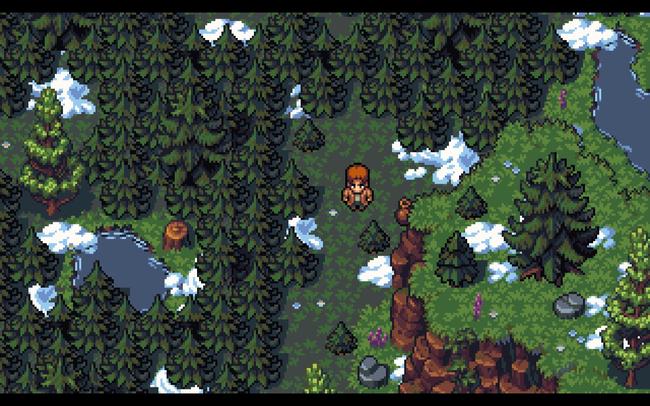
On the flip side, however, character sprites outside the main eight (minus the most generic man in the world, Jerome) often blend together, lacking defining characteristics that help them stand out in the player's memory. I can still clearly visualize Vargas or Lone Wolf from Final Fantasy VI, Gemma from Secret of Mana, or Chrono Trigger's Toma, but I couldn't pull Quartet's Jerome or Corsin out of a police lineup. With a story that jumps around so frequently and requires the player to keep tabs on many different storylines, the blending together of character sprites and identities often had me scrambling to remember a character when they reappeared a dozen hours later. The game's chunky pixel art style works so well for environments, but the character sprites end up in a weird spot where they're large but lack detail. Without options for CRT-style scanlines, they often feel undefined and muddy compared to contemporaries like Chained Echoes, Eastward, or CrossCode.
But, hey, there's a playable hippo with magic, so that's gotta count for something, right?
It's a Team Game
Among the many retro revival RPGs released over the last few years, some, like Chained Echoes, have reached for something new and innovative, while others, like Sea of Stars and Eiyuden Chronicle, stuck with tried-and-true formulas to varying degrees of success. Quartet toes the line between the two, evoking classic turn-based systems like Final Fantasy X, while also leaning heavily into its skill-based character roles and carving its own space in the genre.
Once the entire team's assembled (earlier chapters do feature some temporary companions, so you get into the meat of combat without having to complete all four starting scenarios), all eight combatants are available, though four comprise the fighters in the front row, dealing and taking damage and using skills, and the other four are relegated to the back row where they can quickly recover or dodge attacks. You can swap characters at any given time, providing full access to your entire toolset, or, one of my favourite techniques, swap out a fast character for a slow character to get off the most advantageous skill without having to wait.
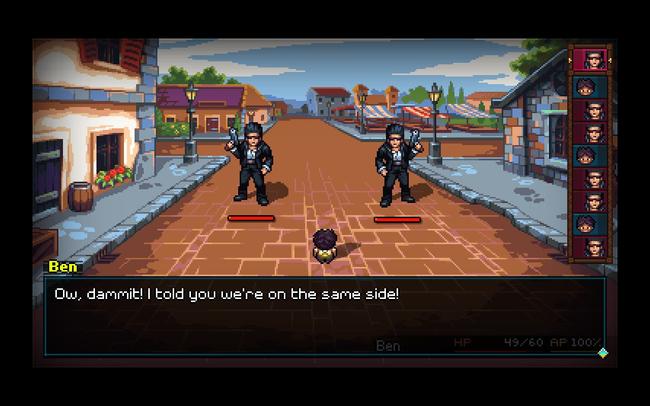
Many of the console RPGs that inspired Quartet use resource management as a fundamental conflict in their difficulty. As you get further away from the safety of a town, delve deeper into the dungeon, your resources of spell points, healing potions, and remedies dwindle, and your role as the player is to manage those resources to ensure you've got the juice for the fight when you reach the tough boss.
Quartet throws all that out the window, adopting an approach to combat that reminded me of Zeboyd Games' Cosmic Star Heroine: Spells and abilities use EP, which recovers every turn and is capped (at 100% to start), so you're incentivized to use skills as needed. Similarly, defending recovers EP more quickly and also gives temporary stat upgrades, making it a strategic tool rather than an afterthought. With access to your full arsenal without worrying about the next conflict, each battle feels almost like a puzzle to solve, rather than a mindless distraction that you'll get through mostly by mashing "A."
By the end, I had my favourite starting team — almost like a baseball team's rotation of starting pitchers — but found every one of the eight valuable in their own way, which helped endear me to them even when their individual stories weren't quite working for me. And once you start finding the clever combinations of skills, or messing with turn order to buff someone up just as they're about to act, the satisfaction hits a level that matches or exceeds the best combat systems in its contemporaries.
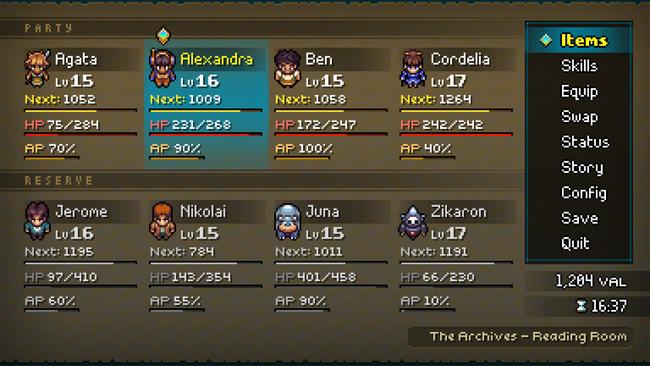
Retro Revival
In this age of throwback RPGs that call on the classics of the past, developers like Something Classic are tasked with something that at once lives up to our childhood memories and stands against the modern gaming landscape. Ultimately, many of my criticisms of Quartet stem from sky-high expectations and lofty comparisons made by its creative team. Despite my issues with structure and pacing, the 25 hours I spent with Quartet breezed by, and expectations aside, it's a worthwhile addition to the ongoing retro revival RPG movement, even if it lands in the B-tier with Eiyuden Chronicle, rather than in the A-tier with Sea of Stars and Chained Echoes. Quartet deeply understands its source material, hewing closely to many of the classic 16- and 32-bit RPGs for inspiration, and mostly succeeds as a game that presents the strengths of that generation while filing off the rough edges. Strong combat and beautiful environments buoy the experience, providing incentive to keep the quest going, even as it struggles a bit with its lofty narrative ambitions.
After an impressive debut with 2017's Shadows of Adam, Quartet is Something Classic's proof that they've grown up and become more confident with age, and that there's room for continued growth to match their ambition. Quartet might not find itself on the highest pedestal alongside its most obvious influences, but against contemporaries attempting similar throwback experiences, it holds its own thanks to a vibrant soundtrack, lush environments, and an immensely satisfying combat system. It might not be something classic, but it's absolutely something worth experiencing, especially if you have a fondness for the mid-'90s golden age of console RPGs